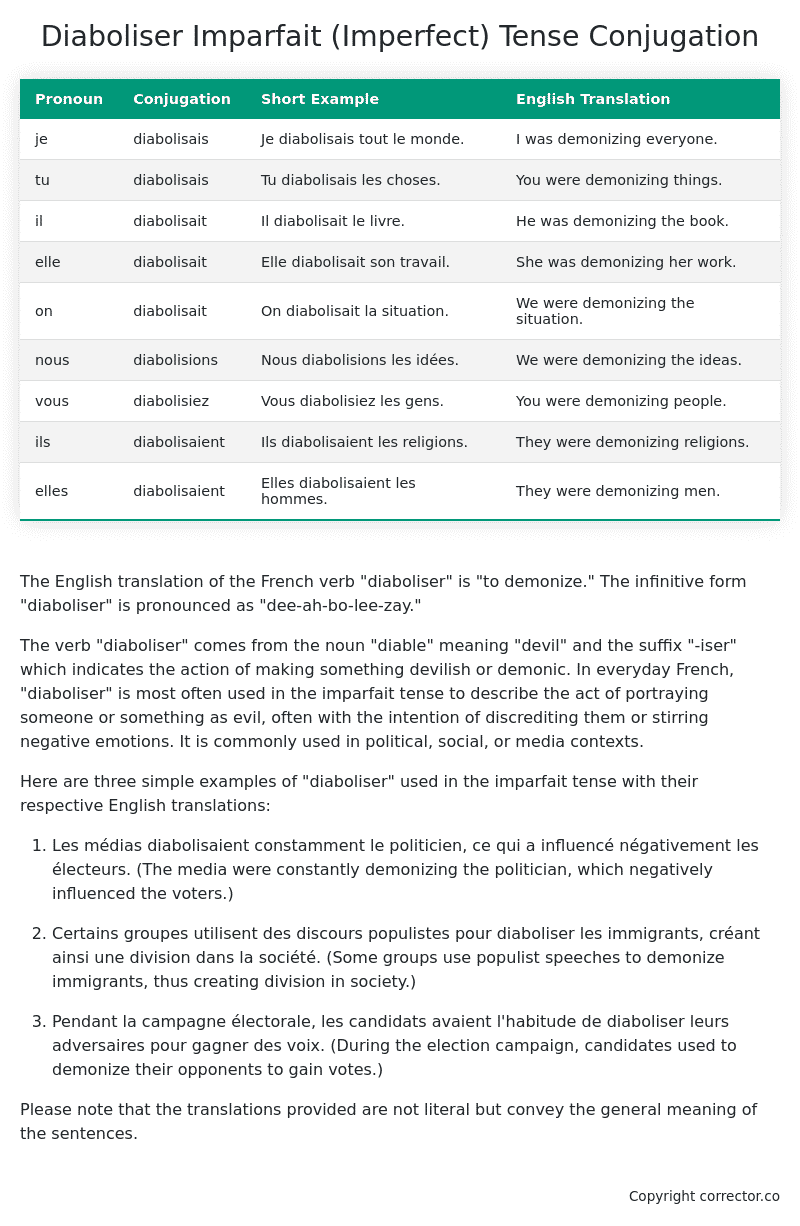Imparfait (Imperfect) Tense Conjugation of the French Verb diaboliser
Introduction to the verb diaboliser
The English translation of the French verb “diaboliser” is “to demonize.” The infinitive form “diaboliser” is pronounced as “dee-ah-bo-lee-zay.”
The verb “diaboliser” comes from the noun “diable” meaning “devil” and the suffix “-iser” which indicates the action of making something devilish or demonic. In everyday French, “diaboliser” is most often used in the imparfait tense to describe the act of portraying someone or something as evil, often with the intention of discrediting them or stirring negative emotions. It is commonly used in political, social, or media contexts.
Here are three simple examples of “diaboliser” used in the imparfait tense with their respective English translations:
-
Les médias diabolisaient constamment le politicien, ce qui a influencé négativement les électeurs.
(The media were constantly demonizing the politician, which negatively influenced the voters.) -
Certains groupes utilisent des discours populistes pour diaboliser les immigrants, créant ainsi une division dans la société.
(Some groups use populist speeches to demonize immigrants, thus creating division in society.) -
Pendant la campagne électorale, les candidats avaient l’habitude de diaboliser leurs adversaires pour gagner des voix.
(During the election campaign, candidates used to demonize their opponents to gain votes.)
Please note that the translations provided are not literal but convey the general meaning of the sentences.
Table of the Imparfait (Imperfect) Tense Conjugation of diaboliser
| Pronoun | Conjugation | Short Example | English Translation |
|---|---|---|---|
| je | diabolisais | Je diabolisais tout le monde. | I was demonizing everyone. |
| tu | diabolisais | Tu diabolisais les choses. | You were demonizing things. |
| il | diabolisait | Il diabolisait le livre. | He was demonizing the book. |
| elle | diabolisait | Elle diabolisait son travail. | She was demonizing her work. |
| on | diabolisait | On diabolisait la situation. | We were demonizing the situation. |
| nous | diabolisions | Nous diabolisions les idées. | We were demonizing the ideas. |
| vous | diabolisiez | Vous diabolisiez les gens. | You were demonizing people. |
| ils | diabolisaient | Ils diabolisaient les religions. | They were demonizing religions. |
| elles | diabolisaient | Elles diabolisaient les hommes. | They were demonizing men. |
Other Conjugations for Diaboliser.
Le Present (Present Tense) Conjugation of the French Verb diaboliser
Imparfait (Imperfect) Tense Conjugation of the French Verb diaboliser (You’re reading it right now!)
Passé Simple (Simple Past) Tense Conjugation of the French Verb diaboliser
Passé Composé (Present Perfect) Tense Conjugation of the French Verb diaboliser
Futur Simple (Simple Future) Tense Conjugation of the French Verb diaboliser
Futur Proche (Near Future) Tense Conjugation of the French Verb diaboliser
Plus-que-parfait (Pluperfect) Tense Conjugation of the French Verb diaboliser
Passé Antérieur (Past Anterior) Tense Conjugation of the French Verb diaboliser
Futur Antérieur (Future Anterior) Tense Conjugation of the French Verb diaboliser
Subjonctif Présent (Subjunctive Present) Tense Conjugation of the French Verb diaboliser
Subjonctif Passé (Subjunctive Past) Tense Conjugation of the French Verb diaboliser
Subjonctif Imparfait (Subjunctive Imperfect) Tense Conjugation of the French Verb diaboliser
Subjonctif Plus-que-parfait (Subjunctive Pluperfect) Tense Conjugation of the French Verb diaboliser
Conditionnel Présent (Conditional Present) Tense Conjugation of the French Verb diaboliser
Conditionnel Passé (Conditional Past) Tense Conjugation of the French Verb diaboliser
Conditionnel Passé II (Conditional Past II) Tense Conjugation of the French Verb diaboliser
L’impératif Présent (Imperative Present) Tense Conjugation of the French Verb diaboliser
L’impératif Passé (Imperative Past) Tense Conjugation of the French Verb diaboliser
L’infinitif Présent (Infinitive Present) Tense Conjugation of the French Verb diaboliser
L’infinitif Passé (Infinitive Past) Tense Conjugation of the French Verb diaboliser
Le Participe Présent (Present Participle) Tense Conjugation of the French Verb diaboliser
Le Participe Passé (Past Participle) Tense Conjugation of the French Verb diaboliser
Struggling with French verbs or the language in general? Why not use our free French Grammar Checker – no registration required!
Get a FREE Download Study Sheet of this Conjugation 🔥
Simply right click the image below, click “save image” and get your free reference for the diaboliser imparfait tense conjugation!

Diaboliser – About the French Imparfait Tense
NOTE: To take a deep dive into all the French tenses then see our article on Mastering French Tense Conjugation.
Formation of the Imparfait Tense
For regular -er verbs:
For regular -ir verbs
For regular -re verbs
Common Everyday Usage Patterns
Description of Past Habits
Background Information
Mental and Emotional States
It’s employed to express emotions, thoughts, or physical sensations in the past. For example: “J’étais content quand il est arrivé.” (I was happy when he arrived.)
Ongoing Actions
Points to Note About the Imparfait Tense
Passé Composé vs. Imparfait
Conditional
Si Clauses
Narration
I hope you enjoyed this article on the verb diaboliser. Still in a learning mood? Check out another TOTALLY random French verb imparfait conjugation!


